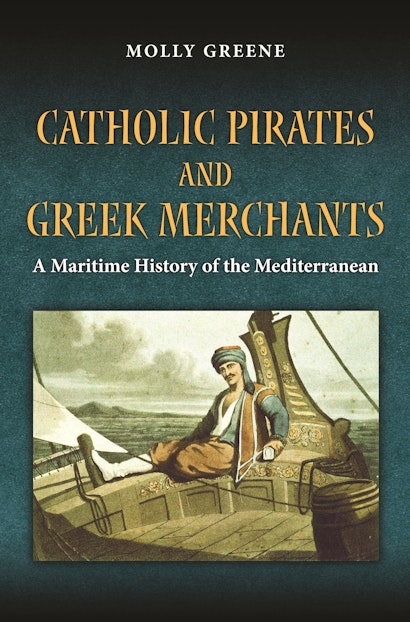A new international maritime order was forged in the early modern age, yet until now histories of the period have dealt almost exclusively with the Atlantic and Indian oceans. Catholic Pirates and Greek Merchants shifts attention to the Mediterranean, providing a major history of an important but neglected sphere of the early modern maritime world, and upending the conventional view of the Mediterranean as a religious frontier where Christians and Muslims met to do battle.
Molly Greene investigates the conflicts between the Catholic pirates of Malta—the Knights of St. John—and their victims, the Greek merchants who traded in Mediterranean waters, and uses these conflicts as a window into an international maritime order that was much more ambiguous than has been previously thought. The Greeks, as Christian subjects to the Muslim Ottomans, were the very embodiment of this ambiguity. Much attention has been given to Muslim pirates such as the Barbary corsairs, with the focus on Muslim-on-Christian violence. Greene delves into the archives of Malta’s pirate court—which theoretically offered redress to these Christian victims—to paint a considerably more complex picture and to show that pirates, far from being outside the law, were vital actors in the continuous negotiations of legality and illegality in the Mediterranean Sea.
Catholic Pirates and Greek Merchants brings the Mediterranean and Catholic piracy into the broader context of early modern history, and sheds new light on commerce and the struggle for power in this volatile age.
Awards and Recognition
- Joint Winner of the 2011 Runciman Award, Anglo-Hellenic League
Molly Greene is professor of history and Hellenic studies at Princeton University. She is the author of A Shared World: Christians and Muslims in the Early Modern Mediterranean (Princeton).
"While Molly Greene has aimed this entertaining book primarily at the maritime historian (and she takes the word 'maritime' in the title very seriously), it is written in a style that would also appeal to the general reader of history. It adds substantially to our understanding of those who lived, worked and thieved their way around the Mediterranean Sea in the early modern period."—Michael Clark, Northern Mariner
"The detailed descriptions and analyses of numerous cases taken from the files of the Tribunale degli Armamenti, which make up the bulk of the book's successive chapters, repay close reading."—Colin Heywood, International Journal of Maritime History
"Greene has found wonderfully illuminating texts. . . . There is much useful material on the lives and dealings of individual merchants and consular agents across the Mediterranean."—Diana Gilliland Wright, Journal of World History
"It was a happy event that led her to tell many of these stories in this book, which is scholarly, well written, and innovative—a worthy joint winner of the Runciman Award in 2011."—Michael Llewellyn Smith, Anglo Hellenic Review
"The book is a great pleasure to read, both for historians and for a more general audience interested in Mediterranean history and the history of corsairs and pirates, a subject usually related to Caribbean pirates and Barbary corsairs. . . . The book offers rich material for further dialogue."—Maria Christina Chatziioannou, European History Quarterly
"This book adds substantially to our understanding of those who inhabited the littoral of the Mediterranean Sea in the early modern period. At its center is the interaction between two sets of actors that have been largely overlooked in histories of the region. Greene tells a fascinating tale. Catholic Pirates and Greek Merchants fills a void in English language scholarship."—Bruce A. Masters, Wesleyan University
"Catholic Pirates and Greek Merchants addresses some crucial issues in the history of the early modern Mediterranean, putting forward a strong and important thesis regarding the early modern history not only of the Mediterranean but of Europe in general. It truly represents an excellent expansion of the work Greene has already done in this field and a significant contribution to Mediterranean history."—Maria Fusaro, University of Exeter


